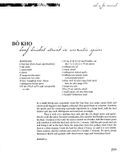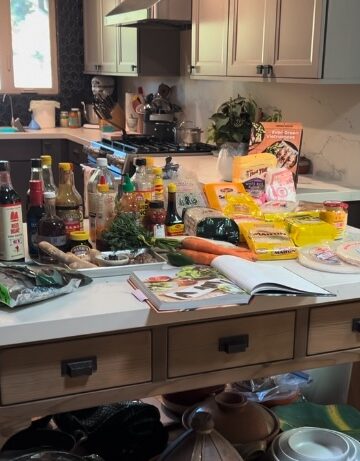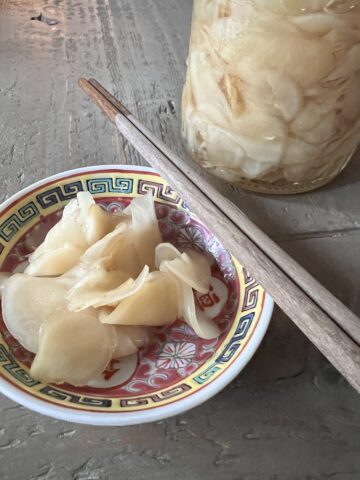
I'm traveling right now and having an email exchange with Geoff in the U.K. He has a recipe from Secrets of the Red Lantern cookbook of the Red Lantern Restaurant in Australia by Luke and Pauline Nguyen (a talented brother-and-sister team!). It's a lovely book and for the bo kho beef stew recipe, one of the aromatics is something called "hop bap." At first, without knowing the recipe or context, I thought it was canned corn.
But then Geoff scanned in the recipe (click on the image to see a larger image of the recipe) and sent it along. (Note the use of coca cola soda.) The book uses diacritic marks inconsistently so I don't know what exactly it is. Is "hop" suppose to be "hot" (seed)? Which of you has a clue? Please let Geoff and me know!
The name of this book is Secret of the Red Lantern and their website says that their recipes are secret ones handed down through the family. Sounds like the Anh family of Crustacean fame in San Francisco. I hope that they didn't withold information from readers as that would be irresponsible.

















Binh says
A mystery indeed. The use of La Vache Qui Rit is also rather interesting.
Anyway, I think you're right about "hop" being "hot". First, it's used as spices in a marinade, in very small quantities (6) and it will be grounded in a mortar, so it must be something in a dry seed/pod form. I am ruling corn out since roasting the corn kennels would pop them, and even if the purpose is to use it as a similar form of "thính" then would all the fragrance would be lost combined with more pungent spices suc
Minh-Nhu says
Hi Guys
I emailed the Red lantern and Pauline herself have replied. Below is her reply
Hi Minh,
Thank you for your email. I am so happy that you have enjoyed mybook...indeed a labour of love.
Hop Bap is a Chinese herb also known as Dried Fructus Tsaoko. It is sometimes known as Grass Nut. The scientific name for it is Amomum Dravanah. BUT if you can't find it, a great substitute is good old cardamom.
Hope this helps.
Eat WellDrink Up Love Much
My Best Wishes,
Pauline Nguyen
Andrea Nguyen says
You are too much! Geoff emailed the restaurant too and Pauline sent the same reply. So, more info about this spice.... it's commonly called in Vietnamese thao qua (black/false cardamom). Available at Asian markets, the dried brown pod resembles a ridged whole nutmeg and has a strong smoky, camphor/menthol aroma. The pods are sold in small plastic packages of 8 or so.
Some Viet cooks like to put thao qua into their beef pho noodle soup broth; they often take it out after about 1 hour because othe
Minh-Nhu Nguyen says
LOL
I agree with you Andrea.
I too have not heard of it being refer as hop bap before either. That's why an ingredient index is always helpful, especially when many of us who don't really speak Vietnamese fluently. The amount of times I've had to use the reference in your book is shameful! LOL
Lenga Nguyen says
Sorry, but any bo kho recipe that uses Con Bo Cuoi cheese deserves the strongest condemnation. If the Red Lantern recipe is a family secret, let it stay that way: a secret.
Andrea Nguyen says
Lenga, hee hee. Good point. I didn't know that the Con Bo Cuoi laughing cow cheese melted that well. I think of it as French Velveeta. Velveeta does melt in a hauntingly strange way...
Sally says
Don't be too hard! I have tried many of the recipes in the secrets of the red lantern! They are delicious and easy to make and I am not vietnamese. I thoroughly enjoyed the whole book. I also went to the restaurant and WOW! I have spend a bit of time eating in and around Cabramatta! What an amazing cuisine! The little research we have to do sometimes just makes it even more interesting.
NaomiF says
I've definitely fascinated by this book! I'm very into Vietnamese cuisine and I want to learn more about it- especially since I'm booking a tour of Vietnam for the spring from http://www.aovtravel.com/guide/special-offers.html. I can't wait to see this gorgeous country!
g star jeans says
I too have not heard of it being refer as hop bap before either.
Jeffrey says
This is the only cookbook on the Vietnamese cuisine that I've found to reveal restaurant secrets that give restaurant quality results! Definitely my favourite asian cookbook. Finally someone is generous enough to share their real secrets rather than withhold them. Makes the difference between average and outstanding results at home. Some results so good I would have returned to a restaurant to eat them again, but managed to make them at home with this book.
Taylor says
It is black cardamom.